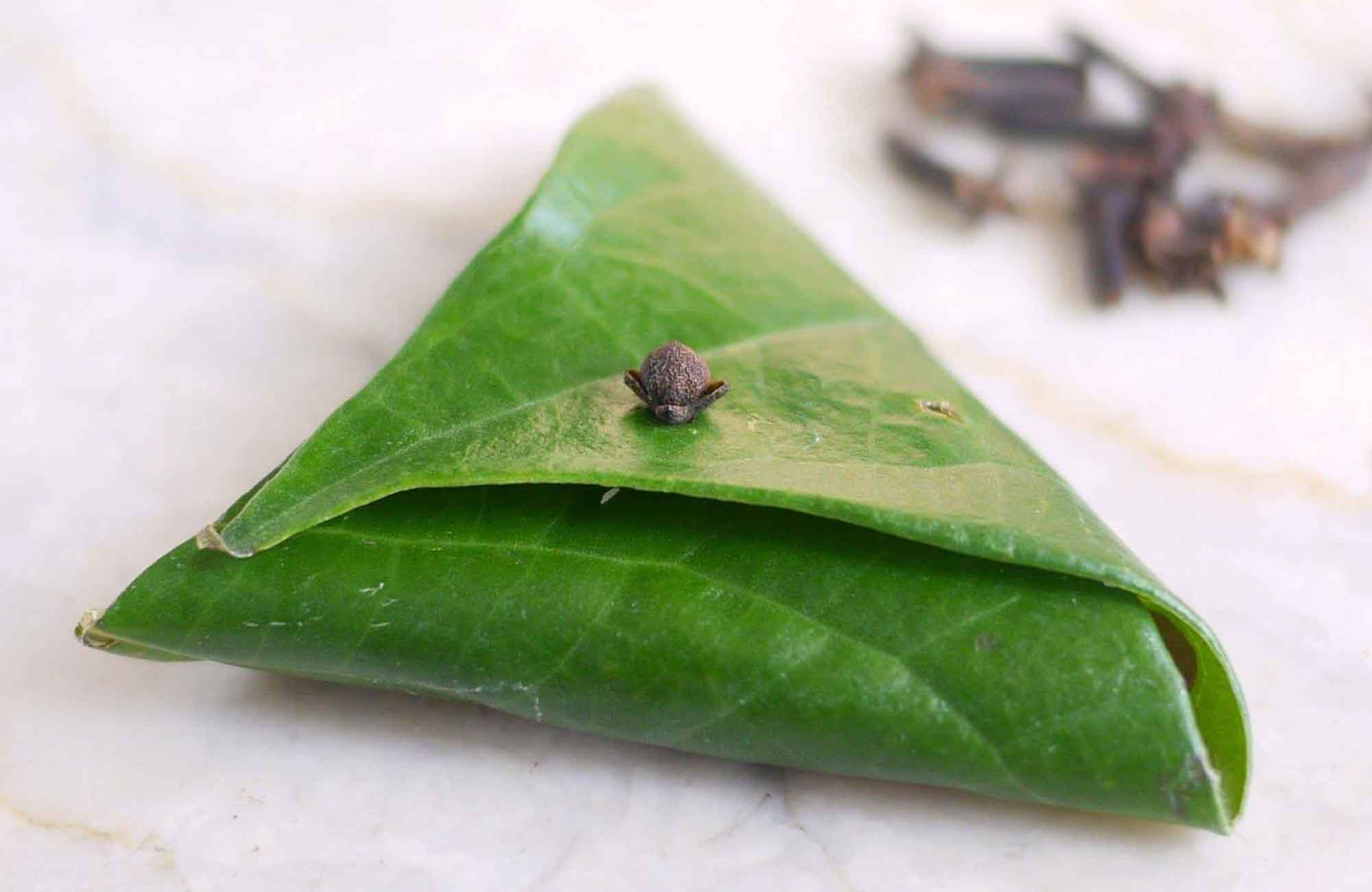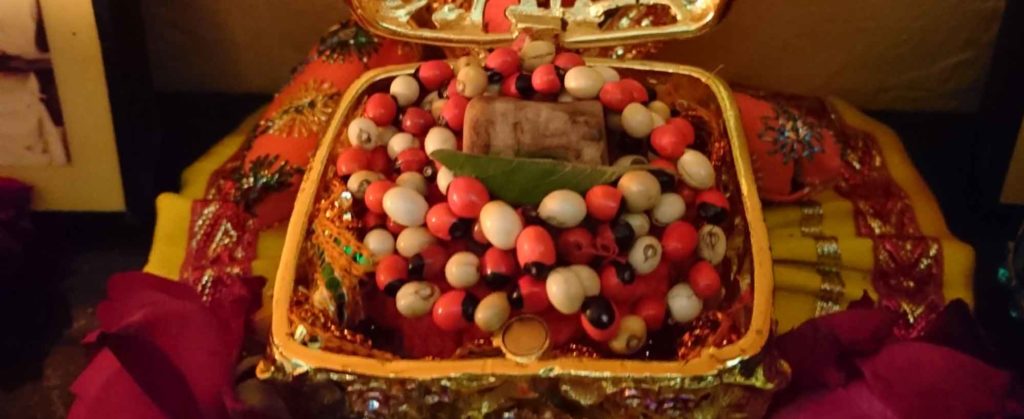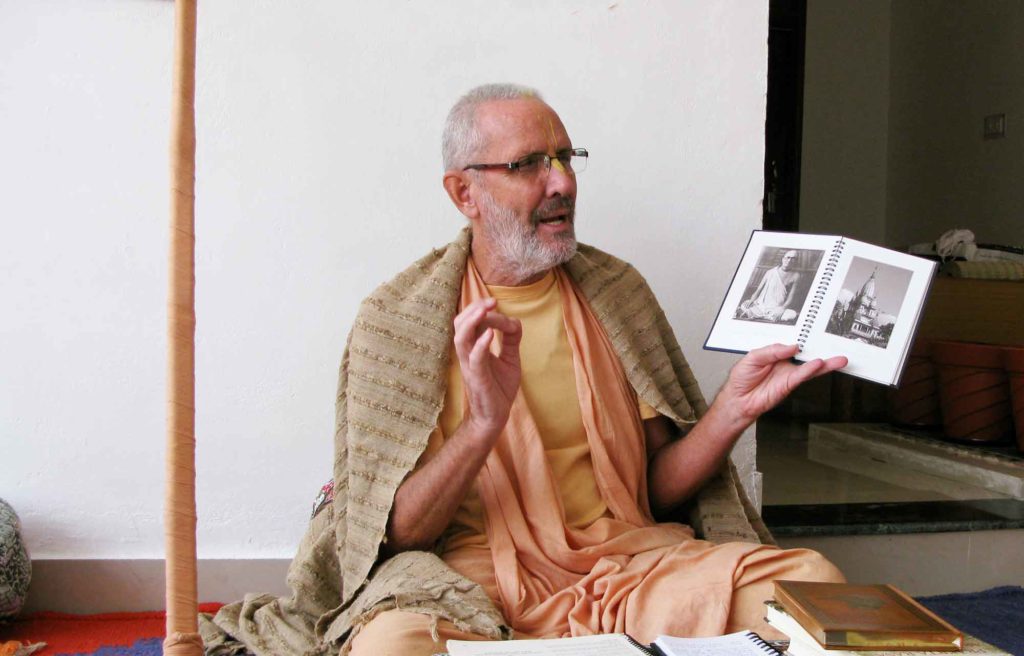Overview
'The Proof of Your Devotion’ was written by Swami B.G. Narasingha on December 31st 2003. A devotee asks Narasingha Maharaja about the standard of actual devotion. Swami Narasingha gives a strong answer and warns against pratiṣṭḥā, the desire for name and fame.
Question: I once heard a devotee say that the proof of when your devotion has become real bhakti is when you can take the betel-nut prasādam from the mouth of Kṛṣṇa and place it in the mouth of Rādhārāṇī. Is this the actual standard by which we are to measure or understand when we have real bhakti?
Answer: If this is how you are to measure real devotion, then you are either dead or dreaming! Dead means that you have already left this mortal world and you are residing in the eternal pastimes of the Supreme Lord, and dreaming means that you are wasting your valuable time with sahajiyā thoughts. In this life real bhakti or devotion is never measured in such a way.
The measure of one’s real devotion is taken from the negative feeling and not from the positive. The less you feel that you have devotion, then the more you actually have it. Or the more you feel that you have devotion, then the less you actually have it. One who thinks he is the lowest is actually the highest and one who thinks he is the highest is actually the lowest.
“I have no love or devotion to Kṛṣṇa. I am so, unfortunate. If I had even a drop of pure love of Kṛṣṇa I could not maintain my life in this mundane world for another moment.” That should be the tenor of our thought.
The negative feelings of the devotee attract Kṛṣṇa. In the negative sentiment we find that the devotee has become very meek and humble. Kṛṣṇa finds this humility very relishable. And where we find the positive feeling, “Yes, I have real devotion” then the devotee becomes puffed up with false pride and Kṛṣṇa is displeased.
Śrī Caitanya Mahāprabhu has shown the negative line in His Śiksāṣṭakam prayers. Mahāprabhu says, “Durdaivam īdṛśam ihājani nānurāgaḥ – I have no love for Your holy name.”
We can approach the holy name of Kṛṣṇa formally, but without entering the negative line of thought as Mahāprabhu prays, then we cannot chant the holy name of Kṛṣṇa from the core of our heart. First admit, “I have no devotion, no love for Kṛṣṇa.” Not only should we feel that we have no love or devotion for Kṛṣṇa but we should also feel that we have no good qualities whatsoever. We are bankrupt of anything favourable for real devotion. We are the lowest of mankind. Worse! We are the lowest of the low. Then we can come to the platform of humility. Then real devotion begins. Then we can have real bhakti.
But our problem is that we think that we are something special, that we have rights and that Kṛṣṇa should honour us by showering us with praises, followers, and wealth. We want to be respected and acknowledged for our insignificant service. We want to be called ‘Prabhu’ or ‘Mahārāja’ or ‘Viṣṇupāda’ or ‘Prabhupāda’ or by some other honorific title. We are offended is someone calls us ‘Dāsa.’ We are offended when we are asked to serve another Vaiṣṇava because we want to be the guru and to be served by everyone. That is our disease. Therefore, we cannot chant the holy name of Kṛṣṇa from the core of our heart and we are simply rotting in this material existence.
We want prestige (an honourable position) but we should know that prestige is our greatest enemy. We should look upon prestige as if it were the stool of a hog and hatefully reject it.
jaḍera pratiṣṭhā, śūkarera viṣṭhā
jāna nā ki tāhā ‘māyāra vaibhava’
“Materialistic prestige is as disgusting as the stool of a hog. Do you not know that it is only a mere illusion cast by the potency of Māyā?” (Vaiṣṇava Ke, verse 2)
So give up everything and accept the lowest position. Rūpa Gosvāmī, Sanātana Gosvāmī, Hari Dāsa Ṭhākura and others were very dear to Lord Caitanya because they rid their hearts of false prestige. Although they were highly qualified devotees they accepted the lowest position and though of themselves as having no good qualities. They were humble and therefore they were very dear to Lord Caitanya.
tṛṇād api sunīcena taror api sahiṣṇunā
amāninā māna-dena kīrtanīyaḥ sadā hariḥ
“One who is humbler than a blade of grass, more forbearing than a tree, who gives due honour to others without desiring it for himself is qualified to always chant the holy name of Kṛṣṇa.” (Śiksāṣṭakam 3)
Hari Dāsa Thakura is recognised by Mahāprabhu as the Nāmācārya, the perfect example of chanting the holy name of Kṛṣṇa. Hari Dāsa was a lower cast by birth, but although he was adorned with all good qualities and very dear to Lord Caitanya he never clamoured for position, or to be respected in society.
In the material world no one is satisfied with the body they have, or with their position in society. Everyone wants a change of position. Women want the position of men. Men want to become women. Everyone wants recognition and everyone is suffering because they do not accept their natural position given to them by the Supreme Lord.
Everyone wants to change, to move up the so-called ladder of success. “I cannot become God, so let me become a master (prabhu) or a sannyāsī or let me become a guru, then I will be successful and satisfied.” But this is simply Māyā’s illusion of success. Change this, change that, and then you will be happy. Then you will be advanced in Kṛṣṇa consciousness. This idea should be rejected.
If change comes to us by the desire or the order of the higher Vaiṣṇavas then we should accept change. Otherwise one should learn to be satisfied with whatever service Kṛṣṇa has given him/her. That is a sign that you have real devotion.
Our only desire should be to serve and we should also desire that any remuneration for our service should simply be more energy for more service, more service and more hankering for more unmotivated service. Let no other desire enter our heart.
Everything for Kṛṣṇa and nothing for one’s self. That should be our attempt. Total self-abnegation to the highest degree and that will take us to a plane of higher life, higher thinking, die to live!
The life of a devotee is based on sacrifice, death of the false ego. As much as there is sacrifice, there is life for a devotee, die to live. If we cannot sacrifice/serve then we might as well never have been born in the human form of life.
The closer we come to Kṛṣṇa, we may think that He is very far away, but we will not abandon our service. We will go on with our service in separation.
āśliṣya vā pāda-ratāṁ pinaṣṭu mām
adarśanān marma-hatāṁ karotu vā
yathā tathā vā vidadhātu lampaṭo
mat-prāṇa-nāthas tu sa eva nāparaḥ
“Kṛṣṇa may embrace me in love or trample me under His feet. He may break my heart by hiding Himself from me. Let that debauchee do whatever he likes, but He will always be the only Lord of my life.” (Śiksāṣṭakam 8)
Mahāprabhu uttered this verse and it is the deep heartfelt sentiments of Śrīmatī Rādhārāṇī that He is expressing. The greatest devotee of Kṛṣṇa is Śrīmatī Rādhārāṇī. She has the greatest love, the greatest devotion to Kṛṣṇa.
Śrīla Śrīdhara Mahārāja once said that if Kṛṣṇa is indifferent to His devotee then that is more intolerable than punishment. The law of love cannot tolerate indifference. Even punishment is more desirable than indifference. In punishment Kṛṣṇa is closer, but if He is indifferent to us then we may naturally feel that everything is lost or that we are unwanted.
When we are chastised or punished by our master then this is a sign that our master cares for our improvement, but if he is indifferent then that may mean that he is disgusted with us. Therefore, a devotee never resents chastisement because he knows it to be the mercy of Kṛṣṇa.
But the fact is that because Kṛṣṇa is an autocrat He is sometimes indifferent and we must be ready to tolerate that and not make any demand of Kṛṣṇa to show us any special attention. Our service must be like that of a slave, without rights or demands. In all circumstance we must go on with our service.
So we will know that our devotion has become real bhakti when we have no demands to make of the Supreme Lord, not even the prayer to become pure so we can serve Him better.
Let whatever karma or suffering is due to us from our previous sinful activities fall on our heads, but let us never deviate from the one pointed desire to serve the Supreme Lord, be it in Heaven or in Hell.
Related Articles and Books
- 📖 Prākṛta-rasa Śata-dūṣaṇī – One Hundred Condemnations of Material Rasa (Book)
- 📖 Prākṛta-rasa Āraṇya Chedinī: Cutting the Jungle of Misconception (Book)
- 📖 The Authorized Sri Caitanya Saraswata Parampara (Book)
- Bhāi Sahajiyā (Part One) by Śrīla Bhaktisiddhānta Sarasvatī Ṭhākura
- Bhāi Sahajiyā (Part Two) by Śrīla Bhaktisiddhānta Sarasvatī Ṭhākura
- Vikrīḍitaṁ vraja-vadhūbhir by Śrīla Bhaktisiddhānta Sarasvatī Ṭhākura
- Ujjvala Nīlamaṇi by Śrīla Bhakti Rakṣaka Śrīdhara Deva Gosvāmī
- Fools Rush In Where Angels Fear to Tread by Śrīla Bhakti Rakṣaka Śrīdhara Deva Gosvāmī
- The Internal Meaning of Ratha Yātrā and Nāma Bhajana by Śrīla Bhakti Pramoda Purī Gosvāmī
- The Rāga-Patha is Above All by Śrīla Bhakti Gaurava Narasiṅgha Mahārāja
- Gītā-Govinda of Jayadeva Gosvāmī by Śrīla Bhakti Gaurava Narasiṅgha Mahārāja
- Gīta Govinda Revisited by Śrīla Bhakti Gaurava Narasiṅgha Mahārāja
- The Proof of Your Devotion by Śrīla Bhakti Gaurava Narasiṅgha Mahārāja
- Vraja Bhāva by Śrīla Bhakti Gaurava Narasiṅgha Mahārāja
- Anartha Nivṛtti by Śrīla Bhakti Gaurava Narasiṅgha Mahārāja
- Hearing From a Rāsikācārya by Śrīla Bhakti Gaurava Narasiṅgha Mahārāja
- The Standard for Higher Līlā Swami B.V. Giri & Swami B.B. Viṣṇu
- Conquering Anarthas by Dhīralalitā Dāsī
Further Reading
Prema Dhāma Deva Stotram with the Narasiṅgha Sevaka Commentary – Verses 61-65
In verses 61 to 65 of 'Prema Dhāma Deva Stotram', Śrīla Śrīdhara Mahārāja narrates the pastime of Śrī Caitanya at Caṭaka Parvata In Purī and explains how the scriptures produced by Brahmā and Śiva are ultimately searching for the personality of Mahāprabhu who is merciful too all jīvas, no matter what their social position.
Prabhupāda Śrīla Sarasvatī Ṭhākura’s Visit to Ayodhyā
With the forthcoming observance of Śrī Rāma Navamī, we present 'Prabhupāda Śrīla Sarasvatī Ṭhākura’s Visit to Ayodhyā' written by Śrīla Bhaktisiddhānta Sarasvatī Ṭhākura Prabhupāda from The Gaudīyā magazine, Vol 3. Issue 21/ In December 1924, after visiting Benares and Prāyāga, Sarasvatī Ṭhākura visited the birth-site of Śrī Rāmācandra in Ayodhyā.
Śaraṇāgati – The Only Path to Auspiciousness
In this article, 'Śaraṇāgati - The Only Path to Auspiciousness', Dhīra Lalitā Dāsī analyses the process of śaraṇāgati (surrender) beginning with śraddhā (faith). She also discusses the role of śāstra and the Vaiṣṇava in connection with surrender.
Ātma Samīkṣā – The Value of Introspection
In this article, "Ātma Samīkṣā – The Value of Introspection" Kalki Dāsa highlights the importance of introspection in the life of a devotee and especially in relation to the worldly environment that surrounds us. He also explains how transcendental sound influences our capacity to introspect.
Prema Dhāma Deva Stotram with the Narasiṅgha Sevaka Commentary – Verses 61-65
In verses 61 to 65 of 'Prema Dhāma Deva Stotram', Śrīla Śrīdhara Mahārāja narrates the pastime of Śrī Caitanya at Caṭaka Parvata In Purī and explains how the scriptures produced by Brahmā and Śiva are ultimately searching for the personality of Mahāprabhu who is merciful too all jīvas, no matter what their social position.
Prabhupāda Śrīla Sarasvatī Ṭhākura’s Visit to Ayodhyā
With the forthcoming observance of Śrī Rāma Navamī, we present 'Prabhupāda Śrīla Sarasvatī Ṭhākura’s Visit to Ayodhyā' written by Śrīla Bhaktisiddhānta Sarasvatī Ṭhākura Prabhupāda from The Gaudīyā magazine, Vol 3. Issue 21/ In December 1924, after visiting Benares and Prāyāga, Sarasvatī Ṭhākura visited the birth-site of Śrī Rāmācandra in Ayodhyā.
Śaraṇāgati – The Only Path to Auspiciousness
In this article, 'Śaraṇāgati - The Only Path to Auspiciousness', Dhīra Lalitā Dāsī analyses the process of śaraṇāgati (surrender) beginning with śraddhā (faith). She also discusses the role of śāstra and the Vaiṣṇava in connection with surrender.
Ātma Samīkṣā – The Value of Introspection
In this article, "Ātma Samīkṣā – The Value of Introspection" Kalki Dāsa highlights the importance of introspection in the life of a devotee and especially in relation to the worldly environment that surrounds us. He also explains how transcendental sound influences our capacity to introspect.








